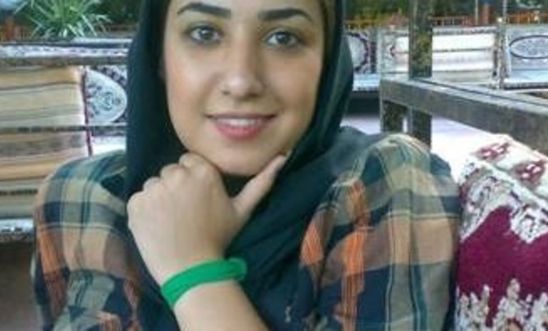
Press releases
Iran: female cartoonist and women's rights activist sentenced to 12 years

‘Atena Farghadani has effectively been punished for her cartoons with a sentence that is itself a gross caricature of justice’ - Hassiba Hadj Sahraoui
Cartoonist’s jail term follows female anti-death penalty activist’s 14-year sentence
The sentencing of Iranian artist and activist Atena Farghadani to more than 12 years in prison - far in excess of the statutory maximum punishment for the charges she faced - is a terrible injustice, and a violation of her rights to free expression and association, Amnesty International said today.
Farghadani, 28, was sentenced to 12 years and nine months in prison on charges of “gathering and colluding against national security”, “spreading propaganda against the system”, “insulting members of parliament through paintings”, “insulting the Supreme Leader of Iran”, and insulting her interrogators.
Iran’s Revolutionary Guards first arrested Farghadani on 23 August last year. She spent several spells in solitary confinement at Tehran’s Evin Prison and started a hunger strike in protest. Farghadani later told media she was interrogated for nine hours every day over a period of a month-and-a-half at Evin. She says she was beaten and subjected to degrading body searches and other mistreatment by guards.
The charges against her stem from her artwork and from her association with the families of those killed in the crackdown that followed Iran’s contested presidential election in 2009. Farghadan had held an exhibition in memory of those killed, while one of her cartoons depicted legislators as monkeys, cows and other animals, satirising the Iranian parliament’s attempt to pass a bill criminalising voluntary sterilisation and restricting access to contraception and family planning services in the country.
Under Iranian law, the maximum statutory punishment that Farghadani could have expected to face under the charges was eight years and six months. However, a provision in Iran’s 2013 Penal Code allows for the imposition of sentences exceeding the statutory maximum when there are more than three crimes. This is giving rise, said Amnesty, to a new trend where the Iranian authorities put together numerous spurious charges to secure multiple convictions. The charges are frequently for vague and overly-broad national security-related offences and for “offences” such as insulting officials or Islamic principles.
Amnesty International Middle East and North Africa Deputy Director Hassiba Hadj Sahraoui said:
“No one should be in jail for their art or peaceful activism.“Atena Farghadani has effectively been punished for her cartoons with a sentence that is itself a gross caricature of justice.“Such harsh and unjust sentences seem to be part of a disturbing trend in Iran, where the cost of voicing peaceful dissent is escalating, with punishments even worse than those issued in the post-2009 election crackdown.”
Another female activist Atena Daemi also recently jailed
Another Iranian activist - 27-year-old anti-death penalty activist Atena Daemi - was recently sentenced to 14 years on multiple charges relating to her peaceful activism last month. The punishment included seven years for “gathering and colluding against national security” and “spreading propaganda against the system”. She was also sentenced for “concealing evidence” and for “insulting the founder of the Islamic Republic of Iran and the Supreme Leader”.
Daemi was arrested by nine members of Iran’s Revolutionary Guards last October and transferred to Evin Prison. She was held in conditions of extreme isolation for 88 days without access to a lawyer, and for the first 20 days her cell was infested with insects and lacked toilet facilities. She said her interrogators offered to grant her easier access to the toilet in exchange for her “cooperation”. She says she was interrogated for 58 days, often for periods of ten hours or longer. During these lengthy interrogations, she had to sit blindfolded while facing a wall. She now has several health problems, including weakness in the limbs and blurred vision.
The charges against Daemi stemmed from her criticism on Facebook and Twitter of executions and human rights violations in Iran, as well as her participation in gatherings outside prisons in solidarity with families of death row prisoners, distribution of anti-death penalty pamphlets and her association with human rights activists and the families of those killed during the post-2009 crackdown. The charge of “insulting the Supreme Leader and founder” of the Islamic Republic of Iran appears to relate to Facebook posts where Daemi made a pun on a famous statement by Ayatollah Khomeini in order to condemn Iran’s execution record over the past three decades, and another where she said his successor, Ayatollah Khamenei, was widely regarded by Iranians as a dictator. The charge of “concealing evidence” appears to relate to her failure to provide her interrogator with details of an activist friend’s Facebook and email accounts.
Daemi was convicted of these charges after a grossly unfair trial at a Revolutionary Court in Tehran. The trial apparently lasted no more than 15 minutes and took place at the same time as the trial of three other prisoners of conscience.
Amnesty considers that Atena Daemi and Atena Farghadani are prisoners of conscience and is calling for them to be freed immediately.
If the sentences are upheld on appeal, both women will serve up to seven-and-a-half years in jail on the most serious charge of “gathering and colluding against national security”, as new provisions in Iran’s Penal Code stipulate that those accused of multiple charges serve the lengthiest single sentence.
Hassiba Hadj Sahraoui said:
“The sheer absurdity of these convictions and long prison sentences reflect the extreme lengths that Iran’s judiciary is going to in order to squeeze the life out of freedom of expression and association.“The Iranian authorities must immediately and unconditionally release Atena Farghadani and Atena Daemi and ensure their convictions and sentences are quashed.”